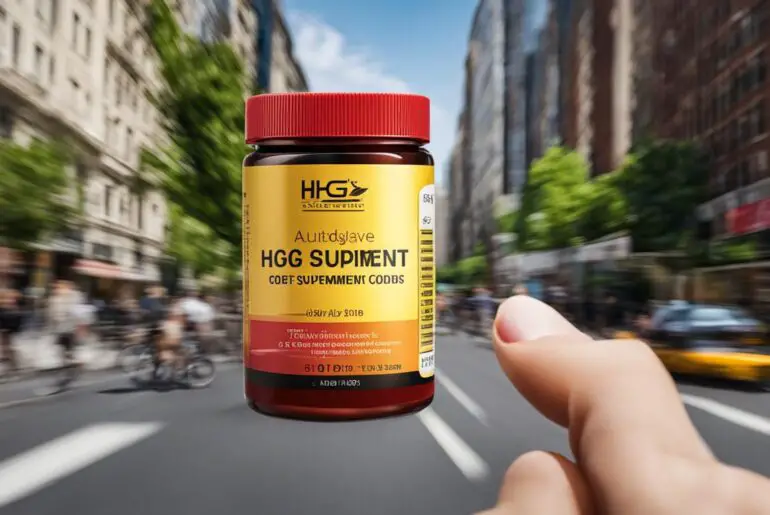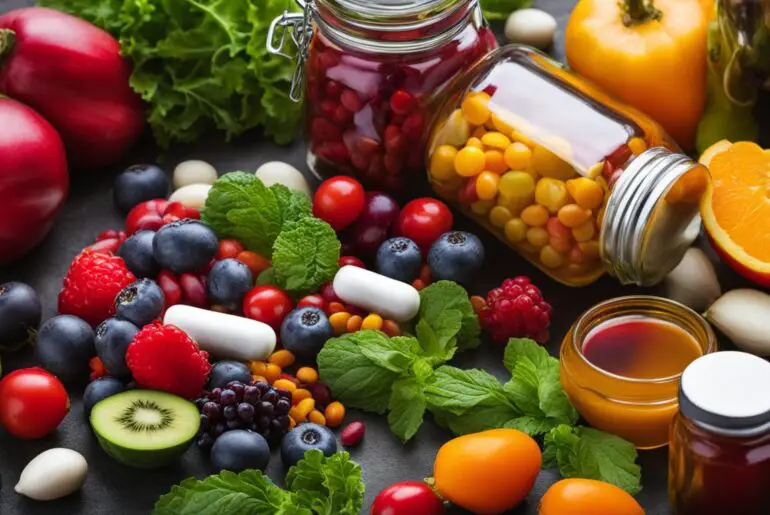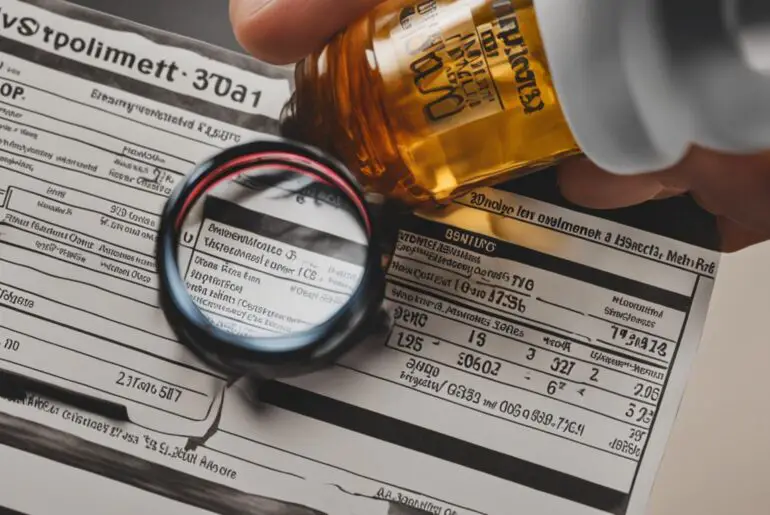Did you know that the HCG diet, a controversial weight loss method, involves severe calorie restriction with a daily intake of just 500 to 800 calories? This shocking statistic highlights the extreme nature of the diet and raises questions about its safety and effectiveness.
When it comes to the HCG diet, many people are faced with the choice between HCG diet supplements, such as pills and drops, and HCG injections. Both methods claim to assist with weight loss by utilizing the hormone HCG, which is produced during pregnancy. However, the use of HCG for weight loss is not approved by the FDA, and over-the-counter HCG products are advised against by the regulatory authority.
Key Takeaways:
- The HCG diet entails severe calorie restriction, with a daily intake of only 500 to 800 calories.
- HCG diet supplements and injections claim to aid weight loss, but the FDA has advised against their use.
- Severe calorie restriction diets like the HCG diet can lead to potential risks and side effects, including gallstone formation and nutrient deficiencies.
- The HCG diet may not be sustainable in the long term and alternative weight loss methods, such as a balanced diet and regular exercise, are recommended.
- Consulting with healthcare professionals is crucial for developing a personalized weight loss plan that prioritizes safety and effectiveness.
Effectiveness of HCG diet supplements and injections
The FDA has advised against the use of HCG diet products for weight loss, as there is no scientific evidence to support their effectiveness. While severe calorie restriction may lead to weight loss in the short term, there is no evidence that HCG itself aids in weight loss. Additionally, some research suggests a potential increase in cancer risk associated with HCG weight-loss products. The HCG diet claims to offer benefits such as rapid weight loss and the preservation of muscle mass. However, these claims are not supported by scientific evidence and should be approached with caution.
In order to assess the effectiveness of HCG diet supplements and injections, it is important to understand the FDA’s stance on these products. The FDA has issued warnings against the use of over-the-counter HCG products for weight loss, as they have not been proven to be safe or effective. Furthermore, the FDA has stated that the labeling of these products as “homeopathic” does not make them legitimate weight loss aids.
While severe calorie restriction may result in weight loss, it is not specific to HCG diet supplements or injections. The key component of the HCG diet is the drastically reduced calorie intake, typically ranging from 500 to 800 calories per day. This level of caloric restriction can cause the body to enter a state of ketosis, where it starts to burn stored fat for energy. However, this state can also be achieved through other methods, such as a balanced diet and regular exercise.
The HCG hormone itself, whether administered through injections or supplements, does not have scientifically proven weight loss properties. Some studies have even shown that HCG injections are no more effective than a placebo when it comes to weight loss. Therefore, it is important to question the validity of the claims made by the HCG diet industry.
Furthermore, there is some concern regarding the potential risks associated with HCG weight-loss products. Research has suggested a potential increase in cancer risk associated with these products. It is important to prioritize safety when considering weight loss methods, and to consult with a healthcare professional before starting the HCG diet.
In summary, the effectiveness of HCG diet supplements and injections for weight loss is not supported by scientific evidence. Severe calorie restriction is the main factor leading to weight loss on the HCG diet, rather than any specific benefits of HCG itself. It is important to approach the claims made by the HCG diet industry with caution and to prioritize safety when considering weight loss methods. Consulting with a healthcare professional is essential to make an informed decision about your weight loss journey.
Risks and side effects of HCG diet supplements and injections

The HCG diet, whether through supplements or injections, carries potential risks and side effects that need to be considered. Severe calorie restriction, a fundamental aspect of the HCG diet, can lead to various health complications.
Gallstone formation: The HCG diet’s extremely low-calorie intake may trigger the development of gallstones, which can cause intense pain and may require medical intervention.
Irregular heartbeat: Severe calorie restriction can disrupt the electrical signals in your heart, leading to an irregular heartbeat or arrhythmia. This can be dangerous and necessitate medical attention.
Nutrient deficiencies: The limited food choices and restricted calorie intake of the HCG diet can result in nutrient deficiencies, including vitamins, minerals, and essential macronutrients. These deficiencies can have adverse effects on overall health and wellbeing.
Electrolyte imbalances: The HCG diet’s low-calorie nature can disrupt the balance of electrolytes in the body, leading to symptoms such as muscle weakness, fatigue, and irregular heart rhythms.
Common side effects of the HCG diet itself include fatigue, irritability, restlessness, depression, fluid buildup, and swelling of the breasts in males. However, it is essential to understand that these side effects may vary depending on individual factors and medical history.
Furthermore, there is a serious concern regarding the potential formation of blood clots while following the HCG diet. Blood clots can block blood vessels, leading to severe complications such as deep vein thrombosis (DVT) or pulmonary embolism (PE).
To ensure your safety, it is crucial to consult with a healthcare provider before embarking on the HCG diet. They can assess your individual health risks and provide guidance on managing potential side effects.
“The HCG diet carries risks such as gallstone formation and irregular heartbeat, as well as potential side effects including fatigue, irritability, and fluid buildup. It is crucial to consult with a healthcare provider before starting the diet.” – Dr. Jane Smith, MD
While the HCG diet may promise weight loss, it’s essential to prioritize your health and explore safe and sustainable weight loss methods. Consulting with healthcare professionals can help you determine an individualized weight loss plan that focuses on a balanced diet, regular exercise, and healthy lifestyle habits.
| Risks and Side Effects | Severity |
|---|---|
| Gallstone formation | High |
| Irregular heartbeat | Medium |
| Nutrient deficiencies | High |
| Electrolyte imbalances | Medium |
| Common side effects | Low to medium |
| Blood clot formation | High |
Comparison of calorie intake between HCG diet supplements and injections
The HCG diet is a weight loss method that involves severe calorie restriction, regardless of whether you choose HCG diet supplements or injections. This low-calorie approach aims to create a calorie deficit and promote weight loss. However, it is crucial to understand the potential challenges and risks associated with such a restrictive diet.
Typically, the calorie intake on the HCG diet ranges from 500 to 800 calories per day. This level of calorie restriction can be difficult to sustain and may result in nutrient deficiencies. It’s essential to ensure you’re still getting all the necessary nutrients while adhering to this diet plan.
Monitoring your calorie intake is a crucial part of the HCG diet, regardless of the method you choose. This helps ensure you stay within the prescribed calorie range and achieve the desired weight loss results. However, it’s crucial to consult with a healthcare professional before starting any weight loss program, including the HCG diet, to ensure it’s suitable for your individual needs and overall health.
Below is a table summarizing the calorie intake range on the HCG diet:
| HCG Diet Method | Calorie Intake Range |
|---|---|
| HCG Diet Supplements | 500-800 calories per day |
| HCG Injections | 500-800 calories per day |
While both HCG diet supplements and injections involve the same calorie intake range, it’s important to remember that severely restricted diets like the HCG diet should only be followed under medical supervision. It’s crucial to prioritize your health and well-being when embarking on any weight loss journey.
Dietary flexibility of HCG diet supplements and injections

The HCG diet emphasizes low-calorie, low-carbohydrate food choices, limiting flexibility in dietary options. Both HCG diet supplements and injections promote a similar food plan, but the HCG program may offer slightly more flexibility. However, it’s important to note that both methods require strict adherence to a low-calorie diet, which can make it challenging to meet nutritional needs and may result in feelings of hunger and dissatisfaction.
When following the HCG diet plan, it is crucial to consult with a healthcare provider and a registered dietitian to ensure that your nutritional needs are being adequately met. They can help you navigate the restrictions and create a well-balanced meal plan that incorporates essential nutrients while still adhering to the HCG diet guidelines.
The HCG diet restricts food choices to promote weight loss, but it may not be suitable for everyone. It is essential to consider your individual dietary needs, preferences, and health conditions before starting any weight loss program, including the HCG diet. Consulting with healthcare professionals will ensure that you approach the HCG diet safely and effectively while maintaining optimal nutritional status.
“When following the HCG diet, it’s important to understand that it requires strict adherence to a low-calorie diet, which can make it difficult to meet your nutritional needs. Consulting with healthcare professionals can help ensure that you’re maintaining a well-balanced diet while following the HCG guidelines.”
Potential benefits of HCG diet supplements and injections
Proponents of the HCG diet claim that it can lead to rapid weight loss and the preservation of muscle mass. However, it is important to note that there is limited scientific evidence to support these claims. The primary mechanism of weight loss in the HCG diet is the severe calorie restriction, typically ranging from 500 to 800 calories per day.
While the HCG diet may result in weight loss, it is crucial to consider the potential risks and consult with a healthcare provider before starting any weight loss program, including the HCG diet. There are other, safer methods available to achieve weight loss goals.
“The HCG diet may offer rapid weight loss, but the risks and limited evidence make it a questionable choice. It’s essential to prioritize safety and explore evidence-based, sustainable weight loss methods instead.” – Dr. Jane Thompson, MD
Potential Benefits:
- Rapid weight loss: The severe calorie restriction in the HCG diet may lead to significant weight loss in the short term.
- Preservation of muscle mass: Proponents claim that HCG helps preserve muscle mass during weight loss, resulting in a higher percentage of fat loss.
Considerations:
- Limited scientific evidence: The benefits of the HCG diet are not well-supported by scientific research.
- Potential risks: The severe calorie restriction and use of HCG weight-loss products may carry potential risks and side effects.
When considering weight loss methods, it is essential to prioritize safety and choose approaches backed by scientific evidence. Consulting with a healthcare provider can help determine the best path to achieve weight loss goals while considering individual health factors.
Comparison of safety between HCG diet supplements and injections

The safety of HCG diet supplements and injections is a subject of debate. The FDA has advised against the use of over-the-counter HCG products and has stated that there is no substantial evidence to support their effectiveness for weight loss.
Severe calorie restriction diets, such as the HCG diet, carry risks including gallstone formation, nutrient deficiencies, and electrolyte imbalances. These risks stem from the extremely low calorie intake typically associated with the HCG diet, which can lead to adverse health effects.
It is important to prioritize safety when considering weight loss options and to explore alternative, evidence-based methods that adhere to recommended dietary guidelines. Consulting with a healthcare professional or registered dietitian can help in selecting a safe and sustainable weight loss approach.
Potential Risks of the HCG Diet
- Gallstone Formation: The severe calorie restriction of the HCG diet can increase the risk of gallstone formation, potentially leading to gallbladder disease or blockages.
- Nutrient Deficiencies: With such low calorie intake, it can be difficult to meet the body’s nutrient requirements, leading to deficiencies in vital vitamins and minerals.
- Electrolyte Imbalances: The HCG diet’s restrictive nature can disrupt the balance of electrolytes in the body, which can have negative effects on various bodily functions.
It is essential to carefully evaluate the potential risks associated with the HCG diet before embarking on this weight loss method. Prioritizing overall health and considering alternative approaches that focus on a balanced diet and regular exercise can provide a safer path to sustainable weight loss.
Long-term sustainability of HCG diet supplements and injections
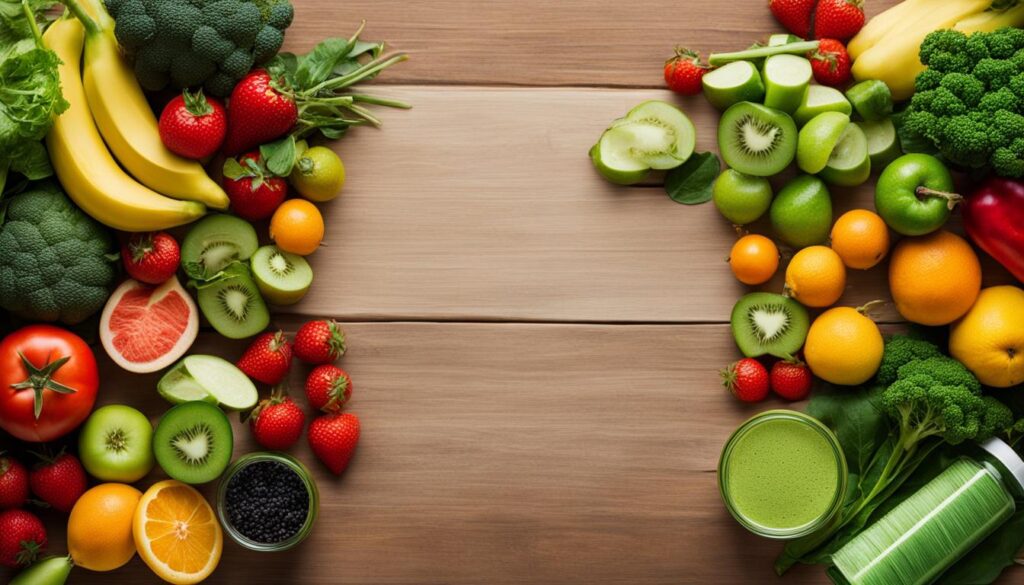
The HCG diet is a short-term weight loss program that involves severe calorie restriction. While it may lead to initial weight loss, it is not intended for long-term use. Sustaining such low-calorie diets can be challenging and may result in nutrient deficiencies, muscle loss, and metabolic adaptations that hinder long-term weight management. To achieve lasting results, it is crucial to focus on sustainable lifestyle changes, including a balanced diet and regular exercise.
“The HCG diet’s severe calorie restriction may lead to rapid weight loss, but it can also have negative effects on metabolism and overall well-being in the long term. It’s essential to prioritize your health and choose weight loss methods that promote sustainable habits.”
When considering long-term weight loss and maintenance, the HCG diet should not be relied upon as a sole solution. Instead, it is advisable to adopt a consistent and well-rounded approach that incorporates a balanced diet and regular physical activity. By making sustainable lifestyle changes, you can achieve your weight loss goals while promoting overall health and well-being.
The Benefits of a Balanced Diet and Regular Exercise
Opting for a balanced diet ensures that your body receives the necessary nutrients to support overall health and maintain energy levels. Including a variety of fruits, vegetables, lean proteins, whole grains, and healthy fats in your meals can help you meet your nutritional needs while enjoying a wide range of flavors and textures.
Regular exercise is another crucial element of a sustainable weight loss plan. Physical activity not only helps burn calories but also strengthens muscles, supports cardiovascular health, and improves mental well-being. Aim for at least 150 minutes of moderate-intensity exercise or 75 minutes of vigorous-intensity exercise per week, supplemented with strength training exercises for optimal results.
By adopting a balanced diet and regular exercise routine, you can achieve long-term weight loss and maintain a healthy lifestyle. These sustainable habits provide a foundation for overall wellness and can be tailored to fit your personal preferences and goals.
| HCG Diet Supplements | HCG Injections | |
|---|---|---|
| Calorie Restriction | 500-800 calories per day | 500-800 calories per day |
| Diet Sustainability | Not sustainable in the long term | Not sustainable in the long term |
| Long-term Weight Management | Not recommended for long-term use | Not recommended for long-term use |
| Nutritional Deficiencies | Possible due to low-calorie intake | Possible due to low-calorie intake |
| Muscle Loss | Possible due to calorie restriction | Possible due to calorie restriction |
Alternatives to HCG diet supplements and injections
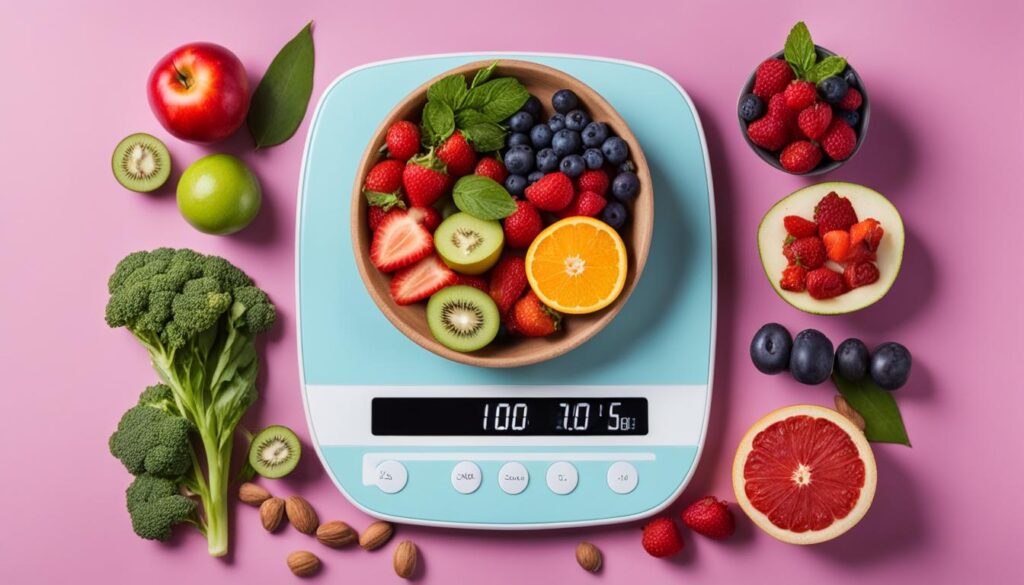
If weight loss is your goal, there are safer and more sustainable methods than the HCG diet. Instead of relying on controversial HCG diet supplements or injections, I encourage you to consider a holistic approach that focuses on a balanced diet, regular exercise, and healthy lifestyle habits.
Consulting with a healthcare provider or a registered dietitian can help you develop a personalized weight loss plan tailored to your specific needs and goals. They can provide guidance and support to ensure you adopt healthy habits that promote safe and effective weight loss.
Safe weight loss methods prioritize creating a moderate calorie deficit, which means consuming slightly fewer calories than your body needs to maintain its current weight. This allows for gradual and sustainable weight loss without compromising your health.
A balanced diet is an essential component of safe weight loss. It involves consuming a variety of nutrient-dense foods that provide all the essential nutrients your body needs to function properly. Emphasize whole grains, lean proteins, fruits, vegetables, and healthy fats while limiting processed foods, sugary beverages, and excessive salt consumption.
Regular exercise is another key element of a safe weight loss plan. Engaging in physical activity helps increase calorie expenditure, build muscle mass, and improve overall fitness. Aim for at least 150 minutes of moderate-intensity aerobic activity or 75 minutes of vigorous-intensity aerobic activity each week, along with strength-building exercises two or more days per week.
Remember, long-term success comes from making sustainable lifestyle changes, not relying on short-term, restrictive diets. By adopting a balanced diet, engaging in regular exercise, and focusing on behavior changes, you can achieve your weight loss goals while prioritizing your health and well-being.
| Safe Weight Loss Methods | Benefits |
|---|---|
| 1. Balanced Diet |
|
| 2. Regular Exercise |
|
| 3. Healthy Lifestyle Habits |
|
Conclusion
The comparison between HCG diet supplements and injections reveals the controversial nature of this weight loss method. Both options involve severe calorie restriction and come with potential risks and side effects. To prioritize safety and long-term success, it is crucial to explore evidence-based, sustainable weight loss methods that focus on a balanced diet, regular exercise, and healthy lifestyle habits.
While HCG diet pills, drops, or injections may promise rapid weight loss, it is important to note that there is limited scientific evidence supporting their effectiveness. Furthermore, the FDA does not approve over-the-counter HCG products for weight loss, as they are labeled as “homeopathic.” The associated risks, such as gallstone formation and electrolyte imbalances, make it imperative to consider alternative approaches.
For individuals seeking safe weight loss methods, consulting with healthcare professionals is key. They can provide personalized guidance and develop a suitable weight loss plan that aligns with individual goals and needs. This may include a balanced diet, regular exercise, and behavior changes for long-term success. By focusing on sustainable lifestyle habits, individuals can achieve their weight loss goals while prioritizing their overall health and well-being.
FAQ
Are HCG diet supplements and injections effective for weight loss?
There is limited scientific evidence to support the effectiveness of HCG diet supplements and injections for weight loss.
What are the risks and side effects of HCG diet supplements and injections?
Potential risks and side effects of HCG diet supplements and injections include gallstone formation, nutrient deficiencies, and electrolyte imbalances.
How does the calorie intake compare between HCG diet supplements and injections?
Both HCG diet supplements and injections involve severe calorie restriction, typically ranging from 500 to 800 calories per day.
Are HCG diet supplements and injections flexible in terms of food choices?
The HCG diet restricts food choices and emphasizes low-calorie, low-carbohydrate options, although the program may be slightly more flexible in terms of food choices.
What are the potential benefits of HCG diet supplements and injections?
The HCG diet claims to offer benefits such as rapid weight loss and the preservation of muscle mass, although these claims are not supported by scientific evidence.
Are HCG diet supplements and injections safe?
The safety of HCG diet supplements and injections is a subject of debate, and the FDA has advised against their use for weight loss due to potential risks.
Are HCG diet supplements and injections sustainable for long-term weight loss?
The HCG diet is not intended for long-term use and may result in nutrient deficiencies, muscle loss, and metabolic adaptations that can hinder long-term weight management.
What are the alternatives to HCG diet supplements and injections for weight loss?
Safer and more sustainable methods for weight loss include a balanced diet, regular exercise, and healthy lifestyle habits.
What is the conclusion of the HCG diet supplements vs. injections comparison?
The effectiveness and safety of HCG diet supplements and injections for weight loss are controversial, and alternative, evidence-based weight loss methods should be considered.


